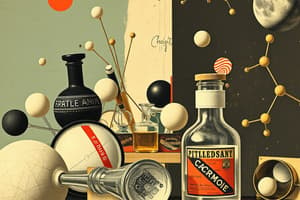Podcast
Questions and Answers
Which of the following characteristics is true for organic compounds?
Which of the following characteristics is true for organic compounds?
- They are primarily composed of non-metals.
- They have carbon-hydrogen bonds. (correct)
- They form ionic bonds.
- They are soluble in water.
What distinguishes inorganic compounds from organic compounds in terms of composition?
What distinguishes inorganic compounds from organic compounds in terms of composition?
- Inorganic compounds contain carbon atoms.
- Organic compounds do not conduct electricity.
- Organic compounds consist of hydrogen, oxygen, and carbon. (correct)
- Inorganic compounds have carbon-hydrogen bonds.
Which statement accurately reflects the volatility of organic and inorganic compounds?
Which statement accurately reflects the volatility of organic and inorganic compounds?
- Inorganic compounds are more volatile than organic compounds.
- Both organic and inorganic compounds are equally volatile.
- Organic compounds are non-volatile.
- Organic compounds are highly inflammable and volatile. (correct)
In terms of reactivity, which statement is correct?
In terms of reactivity, which statement is correct?
Which of the following is a correct comparison of the solubility of organic and inorganic compounds?
Which of the following is a correct comparison of the solubility of organic and inorganic compounds?
Flashcards are hidden until you start studying
Study Notes
Organic Compounds
- Characterized by the presence of carbon atoms; fundamental to life.
- Composed mainly of hydrogen, oxygen, carbon, and various derivatives.
- Generally more volatile and highly inflammable, posing greater risk in fire hazards.
- Exist in solid, liquid, and gas forms, showcasing versatility.
- Insoluble in water, which can affect biological processes and reactions.
- Contain carbon-hydrogen bonds, fundamental for many biochemical reactions.
- Predominantly found in living organisms, playing key roles in biological functions.
- Typically form covalent bonds, leading to a variety of molecular structures.
- Poor conductors of heat and electricity in aqueous solutions, limiting their use in certain applications.
- Examples include fats, nucleic acids, sugars, enzymes, proteins, and hydrocarbon fuels, each vital for life and industry.
- Exhibits biological complexity, with intricate structures and functions essential for life processes.
- Do not form salts, contrasting with inorganic compounds.
- Reaction rates are generally slower, influencing their use in chemical processes.
Inorganic Compounds
- Most lack carbon atoms, although some exceptions like carbides and carbonates exist.
- Do not typically possess hydrogen or oxygen, resulting in different properties than organic compounds.
- Non-flammable and non-volatile, making them stable under various conditions.
- Primarily exist in solid form, with a structured arrangement of particles.
- Soluble in water and some organic solutions, facilitating various chemical reactions.
- Absence of carbon-hydrogen bonds alters reactivity and properties compared to organic compounds.
- Found mainly in non-living entities, including minerals and metals.
- Form ionic bonds, leading to unique properties such as high melting points and electrical conductivity.
- Known as good conductors of heat and electricity in aqueous solutions, useful in electrical applications.
- Include non-metals, salts, metals, acids, bases, and elements, showcasing a range of characteristics.
- Generally of mineral origin and exhibit less complexity in structure and function compared to organic compounds.
- Capable of forming salts, making them relevant in various chemical and industrial processes.
- High rate of reaction, facilitating rapid chemical changes and applications in various fields.
Studying That Suits You
Use AI to generate personalized quizzes and flashcards to suit your learning preferences.




